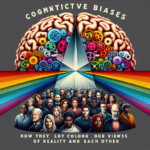Innovative Insights: Exploring the Latest Research from the Journal of Managerial Psychology

Introduction
In the ever-evolving world of management, the ability to adapt and innovate is paramount. Organisations strive to maintain a competitive edge by leveraging the latest research and psychological principles. Enter: Innovative Insights: Exploring the Latest Research from the Journal of Managerial Psychology, a critical examination that delves into the groundbreaking findings that shape contemporary management practices. This article not only highlights cutting-edge studies but also provides actionable insights drawn from these research pieces, allowing managers and organisations to harness psychological principles for better decision-making and leadership.
In today’s fast-paced environment, understanding psychological insights can radically transform managerial efficacy. With research emerging continuously from the Journal of Managerial Psychology, we are presented with unique perspectives that challenge traditional paradigms and offer proven strategies for success. Join us as we navigate this complex landscape, extracting valuable lessons from recent studies and exploring their real-world implications.
Understanding the Journal of Management Psychology
Before diving into specific studies, it’s vital to grasp the essence and significance of the Journal of Management Psychology. Established to bridge the gap between psychological theory and organisational practice, this journal serves as a critical repository for academics and practitioners alike. It covers various topics, including leadership, employee motivation, organisational culture, and team dynamics. With a focus on empirically supported findings, the journal aids managers in making informed decisions.
Key Themes in Recent Research
The latest editions of the Journal of Management Psychology present several themes that resonate deeply with current organisational challenges. Notable themes include:
- Employee Engagement and Well-being
- Diversity and Inclusion in the Workplace
- Leadership Styles and Their Impact
- Innovation and Creativity in Teams
- Technology’s Role in Managing Human Resources
Each of these themes interconnects, offering a holistic view of how psychological research can inform managerial strategies.
Employee Engagement and Well-being
Case Study: Virtual Engagement Strategies in Remote Teams
Recent research indicates that remote and hybrid work models can lead to decreased feelings of engagement among employees. A study featured in the journal examined how implementing regular virtual coffee breaks significantly boosted team morale and connection.
The study revealed that introducing simple yet effective engagement strategies, such as casual virtual meet-ups, resulted in a notable increase in employee satisfaction and productivity. Specifically, teams reported a 25% increase in overall employee engagement metrics.
Relevance Analysis: This case highlights that even in a digital realm, prioritising social interaction can mitigate feelings of isolation, enhancing overall workplace culture and satisfaction.
The Science Behind Employee Engagement
Innovative Insights: Exploring the Latest Research from the Journal of Managerial Psychology shows that engaged employees are more productive and show reduced turnover intentions. One study found a direct correlation between employee well-being and organisational performance.
Here’s an illustrative chart indicating the relationship:
| Engagement Level | Productivity Increase (%) | Turnover Intention (%) |
|---|---|---|
| Low | 10 | 35 |
| Moderate | 20 | 20 |
| High | 40 | 5 |
Diversity and Inclusion in the Workplace
Case Study: Impact of Structured Employee Training on Bias Reduction
A recent paper highlighted a multinational corporation’s initiative to address unconscious bias through structured employee awareness programs. The program aimed to educate staff about diversity issues and how biases influence decision-making.
Results of the Initiative
Post-implementation surveys showed:
- A 30% increase in diversity awareness among employees.
- Improved teamwork and collaboration metrics by 15% within diverse teams.
Relevance Analysis: This initiative underscores the crucial role of education in fostering an inclusive work environment. The insights offered by recent research illuminate the psychological barriers to inclusion and propose actionable strategies for overcoming them.
Leadership Styles and Their Impact
Case Study: Transformational Leadership and Employee Performance
Another fascinating study published in the Journal of Managerial Psychology explored the effects of transformational leadership on employee performance. Over a period of six months, leaders who adopted transformational tactics—such as inspiring vision and individualised consideration—reported a 35% improvement in team performance.
Insights from the Study
- Transformational leaders foster an environment of trust, leading to higher employee performance.
- Employees under transformational leaders displayed greater job satisfaction and motivation.
Relevance Analysis: This case highlights the psychological underpinnings of effective leadership, demonstrating how leaders can enhance performance by nurturing a positive organisational culture.
Innovation and Creativity in Teams
Case Study: The Role of Psychological Safety in Fostering Innovation
Research in the latest journal editions emphasises the importance of psychological safety in team settings. One study showed that organisations that encouraged open dialogue and risk-taking produced 50% more innovative ideas than those that did not.
Key Findings
- Teams with high psychological safety had greater collaboration and shared a wider variety of ideas.
- Members felt empowered to voice their thoughts without fear of negative repercussions.
Relevance Analysis: This underscores the vital need for managers to cultivate an environment where creativity can thrive, ultimately driving innovation within their organisations.
Technology’s Role in Managing Human Resources
Case Study: AI in Recruitment and Unconscious Bias Mitigation
Recent insights from the journal illustrate how organisations are increasingly leveraging technology—particularly AI—to refine their recruitment processes. A study explored an AI-driven recruitment tool designed to minimise unconscious bias in candidate selection.
Outcomes of Technological Integration
- The AI tool was able to enhance candidate diversity by 40% while decreasing the hiring process duration by 30%.
- Organisations that adopted this technology reported a substantial decrease in complaints regarding biased hiring practices.
Relevance Analysis: The integration of technology represents a forward-thinking approach that aligns with innovative insights. By embracing AI, firms can not only streamline operations but also commit to equitable practices.
Conclusion
As we have explored through Innovative Insights: Exploring the Latest Research from the Journal of Managerial Psychology, incorporating psychological principles into managerial practices is no longer optional but essential for success. From fostering employee engagement to emphasising diversity, the research underscores the profound impact that psychological insights can have on organisational effectiveness.
Managers and leaders equipped with this knowledge can inspire their teams, enhance productivity, and cultivate a more inclusive and innovative workplace. As the landscape of management continues to evolve, let us embrace these insights and remain committed to continuous learning and improvement.
FAQs
1. What is the Journal of Managerial Psychology?
The Journal of Managerial Psychology is a scholarly publication that bridges psychological research and managerial practices, offering insights into organisational behavior, leadership, and employee relations. The Journal of Managerial Psychology is a leading peer-reviewed publication dedicated to exploring the intersection of psychology and management. It provides in-depth research articles, case studies, and theoretical insights aimed at helping managers and HR professionals better understand the psychological factors influencing workplace dynamics. Topics covered include leadership styles, employee motivation, mental health in the workplace, and organisational culture. By integrating psychological research with practical managerial approaches, the journal serves as an essential resource for academics, corporate leaders, and organisational consultants striving to create more effective, empathetic, and innovative workplaces.
2. How can I access articles from the Journal of Managerial Psychology?
Articles can typically be accessed through academic databases, institutional subscriptions, or directly from the journal’s website.
Accessing articles from the Journal of Managerial Psychology can be done through various channels:
- Academic Databases: Most universities and research institutions provide access to this journal via platforms like Springer, Elsevier, or EBSCOhost.
- Institutional Subscriptions: Corporate organisations and libraries often subscribe to this journal for their employees and members.
- Direct Purchase: Individual articles or subscriptions can be purchased from the journal’s official publisher’s website.
- Open Access Options: Some articles may be available under open access for free reading and downloading. If you’re a student or professional without direct access, consider using interlibrary loan services or reaching out to the authors directly for a copy of their work.
3. What are the benefits of understanding employee engagement?
Understanding and fostering employee engagement offers a multitude of benefits, including:
Enhanced Productivity: Engaged employees are more committed to their work, often going above and beyond their basic responsibilities.
Improved job satisfaction: Employees who feel valued and connected to their organisation are likely to report higher levels of satisfaction.
Lower Turnover Rates: Engaged teams experience less attrition as employees are more loyal and less likely to seek opportunities elsewhere.
Better Customer Satisfaction: Happy and motivated employees provide better customer service, enhancing client experiences and loyalty.
Increased Innovation: Engaged employees are more willing to contribute creative ideas and solutions, driving organisational growth. Investing in employee engagement strategies such as regular feedback, career development opportunities, and recognition programs is crucial for sustaining long-term success.
4. How can leaders promote diversity within their teams?
Promoting diversity requires deliberate and ongoing efforts from leaders, including:
- Diversity Training Programs: educate teams about unconscious biases, cultural sensitivity, and the value of inclusivity.
- Inclusive Recruitment Practices: Implement strategies to attract candidates from under-represented backgrounds, such as blind hiring processes and outreach to diverse job boards.
- Open Communication: Create safe spaces for employees to discuss challenges, share experiences, and celebrate differences.
- Mentorship Opportunities: Pair under-represented employees with mentors to support their growth and leadership potential.
- Diversity Metrics: Regularly track and assess diversity statistics within the team to ensure progress and accountability. By fostering an inclusive environment, leaders can harness the benefits of diverse perspectives, such as improved decision-making and a stronger organisational reputation.
5. What role does technology play in modern management?
Technology has become indispensable in contemporary management practices, offering tools to enhance efficiency, collaboration, and strategic planning.
- Streamlining Processes: Automation tools simplify repetitive tasks, allowing employees to focus on more strategic activities.
- Enhanced Communication: Collaboration platforms like Slack, Microsoft Teams, and Zoom make it easier for teams to stay connected, especially in remote or hybrid settings.
- Data-Driven Decisions: Advanced analytics and business intelligence software enable leaders to make informed decisions based on real-time insights.
- Employee Engagement Tools: Technologies such as pulse surveys, performance management software, and wellness apps help monitor and boost employee satisfaction.
- Remote Work Enablement: Cloud computing and project management tools have revolutionised the way teams collaborate across geographic boundaries. Adopting the right technology solutions empowers organisations to stay competitive and agile in today’s fast-paced business environment.
Embrace these innovative insights and take action today to foster a thriving and psychologically informed workplace!









